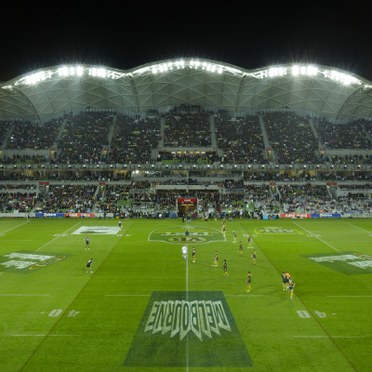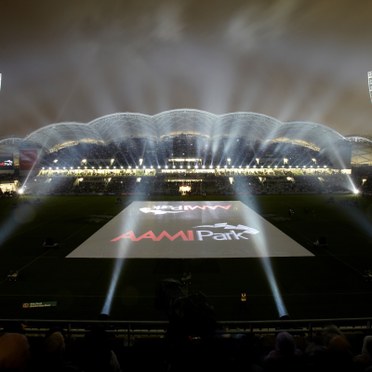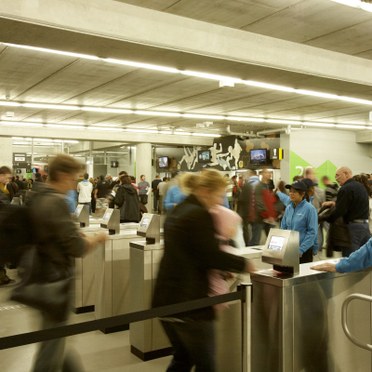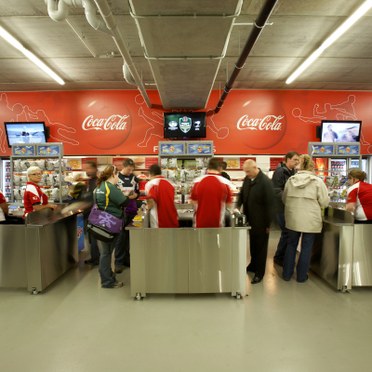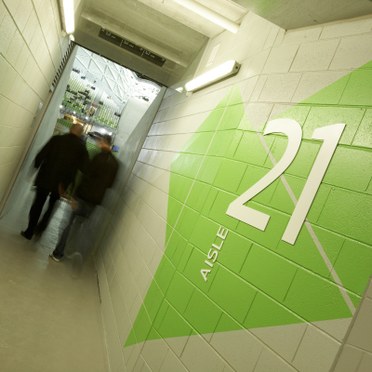AAMI Park, Australia
- Lamp efficacy
Lamp efficacy
Ensuring the lamp efficiently converts electricity into light (lm/W).
- Ballast classification
Ballast classification
Controlling the electricity supply to the lamp (Energy Efficiency Index).
- Luminaire distribution
Luminaire distribution
The beam distribution and throw are exceptional while the variable lamp holder position enables a choice of concentrated distributions to suit the location within the stadium structure.
- System efficacy
System efficacy
Combining optical and thermal control within the luminaire (luminaire lm/W).
- Presence/absence detection
Presence/absence detection
Providing lighting only when it’s needed.
- Daylight detection
Daylight detection
Reducing waste light during daylight hours.
- Constant illuminance
Constant illuminance
Producing the correct lighting levels for the duration of the maintenance period.
- Task-scene setting
Task-scene setting
Allowing the user to set scenes and adapt the lighting to different tasks.
- Timed off
Timed off
Automatic cut-off to turn all lights off during unoccupied hours.
- Task lighting
Task lighting
The specific optical designs make long-range floodlighting a lot easier and more precise, giving great results for sport and television broadcasting while minimising glare for the spectators and players.
- Zoning of lighting
Zoning of lighting
Zoning lighting in accordance to occupancy patterns or window location.
- Maintenance schedule
Maintenance schedule
Tailoring maintenance schedules in accordance to product age, performance and environment.
- Waste light
Waste light
Careful selection of high performance optics and good lighting scheme design mean the light spill from the stadium is minimal, which in turn minimises waste energy consumption.
- Reflectance
Reflectance
Taking advantage of light which is reflected from the surface within the space.
- Visible smart metering
Visible smart metering
Enabling results of actions to be quickly seen as increased or decreased energy use to encourage responsible energy consumption.
Przypominając szereg gigantycznych baniek, ta kopułowata konstrukcja (zwana AAMI Park) to główny prostokątny piłkarski stadion Melbourne.
Trudnego zadania oświetlenia go podjęła się firma Thorn Australia wykorzystując projektory Mundial. Te niezwykle silne reflektory metalohalogenkowe o mocy 2kW zapewniają wysokiej jakości oświetlenie zadania spełniające rygorystyczne wymogi międzynarodowych/krajowych transmisji sportowych i telewizyjnych (średnio 2 000 lx na płaszczyzny pionowe i 2600 lx na płaszczyzny poziome). Ich korzyścią jest wyjątkowy promień światła, a zmienne położenie oprawki lampowej daje wybór rozsyłów skoncentrowanych. To powoduje, że oświetlanie na odległość jest o wiele łatwiejsze i bardziej precyzyjne, dając dobrą równomierność i ograniczając oślepianie i światło przeszkadzające do minimum.
Początki projektu sięgają roku 2005, kiedy to firma Thorn pracowała z NDYLIGHT i Cox Architects dostarczając projekty konceptualne dla lokalizacji oświetlenia murawy i wyposażenia wnętrza, które swoim zakresem sięgały od opraw kubełkowych do opraw świetlówek liniowych. Wówczas Thorn wsparł NDYLIGHT informacjami technicznymi i wyrobami dla zaplecza i stref publicznych.
Krytycznym momentem projektu było opracowanie sportowego układu oświetlenia wtapiającego się w pożądaną formę architektoniczną stadionu bez obniżania parametrów oświetleniowych. Jako najbardziej odpowiednie zostały wybrane oprawy Mundial. Projekt oświetlenia przewidywał 344 tych projektorów z różnymi rozsyłami promienia. Są one zamontowane na czterech narożnych wieżach i wzdłuż konstrukcji dachu.
Zdobycie tego kontraktu było wielkim osiągnięciem Thorn Australia. Pomocne w tym okazało się przestrzeganie filozofii programu PEC (Performance, Efficiency and Comfort) firmy skupiającego się na aspektach parametrów oświetleniowych, skuteczności i wygody, wykorzystanie dobrej jakości opraw do zastosowań sportowych oraz dobre wartości / standardy projektowania.

